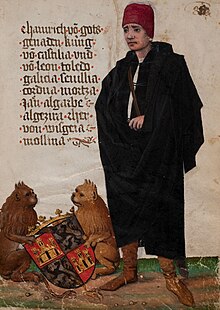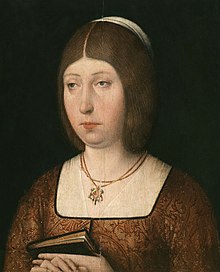Joan of Castile (Portugal)
Joana of Castile (called Juana la Beltraneja ( Spanish ) or in Portuguese Joana a Beltraneja or la hija de la reina (the queen's daughter)) (born February 28, 1462 in Madrid , † April 12, 1530 in Lisbon ) was 1462 Princess of Asturias until 1464 and Queen of Portugal from 1475 to 1481 .
origin
Joan was born the daughter of King Henry IV of Castile and Joan of Portugal , a daughter of King Edward I of Portugal . Her father married Blanka von Navarra (* 1424, † 1464) in 1440 at the age of 15. The marriage was in 1453 by a court of the Archbishop of Segovia for invalid explained. The reason given was the husband's impotence (Heinrich IV). In 1455, Henry IV married Juana de Avis y Aragón, sister of the Portuguese king Alfonso V. Six years later, Joanna of Castile was born. The wife of Henry IV, Queen Johanna, openly cultivated a revealing lifestyle. She is responsible for at least two illegitimate children. These facts made it seem improbable to some contemporaries that Henry IV was Johanna's father. It was believed that Beltrán de la Cueva was the real father. Hence the infanta was nicknamed "la Beltraneja".
Succession to the throne
The Cortes who gathered in Madrid recognized Johanna as heir to the throne immediately after her birth . On November 30, 1464, Henry IV disinherited his daughter, but without declaring her illegitimate, and named his half-brother Alfons as heir to the throne. After Alfonso's death in 1468, his sister Isabella saw herself as the rightful heir to the throne. In the Torros de Guisando pact of September 18, 1468, the king continued to refer to Johanna as his daughter. However, the king stated that his marriage to Joanna of Portugal was invalid because there had been no dispensation because of the close relatives and therefore a succession to the throne from Joanna was excluded. He officially named Isabella his heiress and bestowed on her the title of Princess of Asturias, which the heirs of the Crown of Castile have officially held since John I.
War of Succession
Henry IV died in Madrid on the night of December 11-12, 1474. On December 13, 1474, Isabella was proclaimed Queen of Castile in Segovia. She led the government in the countries of the Crown of Castile together with her husband Ferdinand V. The then 12-year-old Johanna was in the care of the Marquis of Villena. The attitude of the Castilian nobility and the population with regard to the support of Johanna or Isabella was inconsistent. At the end of December 1474, King Alfonso V of Portugal asked the Castilian nobles to recognize his niece Joan as Queen of Castile. In order to involve Castile in a two-front war, Alfons entered with the French King Louis XI. in negotiations. Ludwig was to attack Castile from the north. From May 10th to May 30th, 1475 a Portuguese army of around 15,000 men crossed the border between Portugal and Castile in various places and took the route to Salamanca and Zamora. Alfons occupied Toro but Ferdinand blocked his way to Burgos. On May 29, 1475 the then 13-year-old Johanna married her 43-year-old uncle Alfons V. Ferdinand in Plasencia , and Isabella was able to raise a troop of 2,000 men (riders with armor and lances), 6,000 riders and 20,000 infantrymen with whom she Marched towards Toro in July. In terms of number, the Castilian troops were far superior to the Portuguese. However, it was undisciplined and had no uniform command structure. On July 15, Ferdinand was informed that Zamora had opened the gates to the enemy. He then dropped his plan to take Toro. In March 1476 the French attack took place, which had been expected for several months: 50,000 men crossed the border in Hendaye . However, the attack was repulsed, also with the support of the Basque Navy. In the Battle of Toro on March 1, 1476, King Ferdinand forced the enemy to retreat and thus gave the war the decisive turning point. The two leaders of the party advocating Johanna in Castile, the Marques de Villena and Alfonso Carrillo the Archbishop of Toledo, submitted to the Catholic Kings in September 1476. This ended the civil war phase of the succession dispute in 1476. After the Battle of Toro there was hardly any fighting between Portugal and Castile. However, several Castilian border fortresses continued to be occupied by Portugal. It was not until February 1479 that Alfonso V attacked Castile again. A Portuguese army under the command of García de Meneses, the bishop of Evora, crossed the border near Badajoz. On February 24, 1479, the Portuguese were defeated in Albuera by the Castilian troops under the leadership of Alfonso de Cárdenas, Grand Master of the Order of Santiago . Then Alfons was ready to negotiate.
Treaty of Alcáçovas
The peace negotiations dragged on for months as all problems between Portugal and Castile were to be finally resolved. On September 4, 1479, the Treaty of Alcáçovas was signed and ratified on March 6, 1480 by the Catholic Monarchs in Toledo. The contract consists of four parts. In the first part the division of the areas of interest in Africa and the Atlantic is regulated. The second part deals with Johanna's future. The contract offered Johanna two choices. The first option was to marry John of Aragon and Castile, the Hereditary Prince of Castile, when he was fourteen. Until then, d. H. for the next thirteen years if she were under guard in Portugal. The contract also contained a clause stating that Johann could refuse the marriage. The second option was for Johanna to enter a monastery in Portugal. Johanna chose the second option. She entered the Convent of the Poor Clares in Coimbra as a novice on November 5, 1479 . Despite entering the monastery, King Alfonso awarded her the title of Infanta, the title of Excellency (Excelente Senhora). When she her on November 15, 1480 vows took off, was Hernando de Talavera the confessor of Queen Isabella present who stayed out on their behalf that no formal errors subverted. Until her death in 1530 Johanna considered herself queen and signed her letters that way.
See also: List of the Queens of Portugal , List of the Kings of Portugal , Portugal under the House of Avis , History of Portugal , Timeline of the History of Portugal .
Individual evidence
- ^ Congregatio pro causis sanctorum officium historicum (ed.): Elisabeth I (by Isabel la Catolica) -Positio super vita, virtutibus et fama sanctits ex officio concinnata . Arzobispado de Valladolid, Valladolid 1990, ISBN 84-404-7170-X (Spanish, online [PDF; accessed October 3, 2015]).
- ↑ Joseph Perez: Ferdinand and Isabella . Callwey, Munich 1989, ISBN 3-7667-0923-2 , pp. 59 (From the French by Antoinette Gittinger).
- ↑ Joseph Perez: Ferdinand and Isabella . Callwey, Munich 1989, ISBN 3-7667-0923-2 , pp. 60 (from the French by Antoinette Gittinger).
- ↑ Joseph Perez: Ferdinand and Isabella . Callwey, Munich 1989, ISBN 3-7667-0923-2 , pp. 60 (from the French by Antoinette Gittinger).
- ↑ Joseph Perez: Ferdinand and Isabella . Callwey, Munich 1989, ISBN 3-7667-0923-2 , pp. 89 (from the French by Antoinette Gittinger).
- ↑ Joseph Perez: Ferdinand and Isabella . Callwey, Munich 1989, ISBN 3-7667-0923-2 , pp. 89 (from the French by Antoinette Gittinger).
- ↑ Walther L. Bernecker; Horst Pietschmann: History of Spain - From the early modern era to the present . 4th edition. W. Kohlhammer, Stuttgart 2005, ISBN 3-17-018766-X , p. 39 .
- ↑ Walther L. Bernecker; Horst Pietschmann: History of Spain - From the early modern era to the present . 4th edition. W. Kohlhammer, Stuttgart 2005, ISBN 3-17-018766-X , p. 41 .
- ↑ Joseph Perez: Ferdinand and Isabella . Callwey, Munich 1989, ISBN 3-7667-0923-2 , pp. 100 (from the French by Antoinette Gittinger).
literature
- Joseph Perez: Ferdinand and Isabella . Callwey, Munich 1989, ISBN 3-7667-0923-2 , pp. 394 (from the French by Antoinette Gittinger).
- Walther L. Bernecker; Horst Pietschmann: History of Spain - From the early modern era to the present . 4th edition. W. Kohlhammer, Stuttgart 2005, ISBN 3-17-018766-X .
Web links
- Vicente Ángel Álvarez Palenzuela: La guerra civil castellana y el enfrentamiento con Portugal. (1475-1479). Biblioteca Virtual Miguel de Cervantes, accessed October 18, 2014 (Spanish).
swell
- Translator Dr. JA Robertson: Treaty Between Spain and Portugal, Concluded at Alcacovas, September 4, 1479. Lillian Goldman Law Library, accessed October 13, 2014 .
| predecessor | Office | successor |
|---|---|---|
| Henry of Trastámara and Trastámara ( Henry IV. ) |
Princess of Asturias 1462–1464 |
Alfonso of Trastámara and Avis ( Alfonso of Castile ) |
| Isabella of Portugal |
Queen of Portugal 1475–1481 |
Eleanor of Portugal |
| personal data | |
|---|---|
| SURNAME | Joan of Castile |
| ALTERNATIVE NAMES | Juana La Beltraneja; Joana a Beltraneja |
| BRIEF DESCRIPTION | portuguese queen |
| DATE OF BIRTH | February 28, 1462 |
| PLACE OF BIRTH | Madrid |
| DATE OF DEATH | April 12, 1530 |
| Place of death | Lisbon , Portugal |



